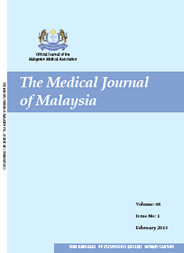MJM, Vol 70 Supplement 1 September 2015
Predictors of adherence behaviour among HIV
positive patients receiving Antiretroviral Therapy (ART) in Malaysia
*Department of Community Health, Faculty of Medicine and Health Sciences, Universiti Putra Malaysia, Serdang, Malaysia, **Hospital Sungai Buloh, Malaysia, ***Department of Paediatrics, Faculty of Medicine and Health Sciences, Universiti Putra Malaysia, Serdang, Malaysia
ABSTRACT
Introduction: Success of antiretroviral treatment depends on a host of factors, the most important of which is the patient’s adherence behaviour. The objective of this study was to determine whether the introduction of mobile phone technology (SMS and telephone call reminders) can significantly improve adherence and treatment outcomes among HIV positive patients on ART. This paper highlights ‘context-specific’ predictors of adherence behaviour among a cohort of Malaysian patients receiving ART.
Methods: A single-blinded RCT was carried out in Hospital Sungai Buloh between January and December 2014 among HIV positive patients on ART. Data on socio-demographic factors, clinical symptoms, and adherence behaviour, assessed using the modified and pre-validated Adult AIDS Clinic Trials Group adherence questionnaires were collected. CD4 count, viral load, weight, full blood count, blood pressure, liver function and renal profile tests were also conducted and recorded. Multivariate regression models were used to examine the relationship between study variables using SPSS version 21 and R software.
Results: The overall mean age of 242 respondents was 33.4 (standard deviation (SD) 9.2, range 18-64) years. Majority (88.8%) were males. Overall, 47.9% of respondents were placed on ZDV/3TC/EFV regimen, 47.1% took TDF/FTC/EFV regimen at baseline (ART initiation) while other HAART regimens accounted for only 5% of the distribution altogether. Univariate logistic regression analysis showed that adherence behaviour was significantly associated with ethnicity, monthly income and employment status. After controlling for the effect of age and treatment group, multivariate multinomial logistic regression analysis showed that patient’s employment status (adjusted Odds Ratio 4.46; 95% CI: 3.22, 6.18) was a significant predictor of adherence behaviour among HIV positive patients receiving ART in Malaysia.
Conclusion: The findings provide additional support to the growing body of evidence on the strong relationship between patient’s employment status and their adherence behaviour, particularly in concentrated epidemics and low-to-middle income economies.
